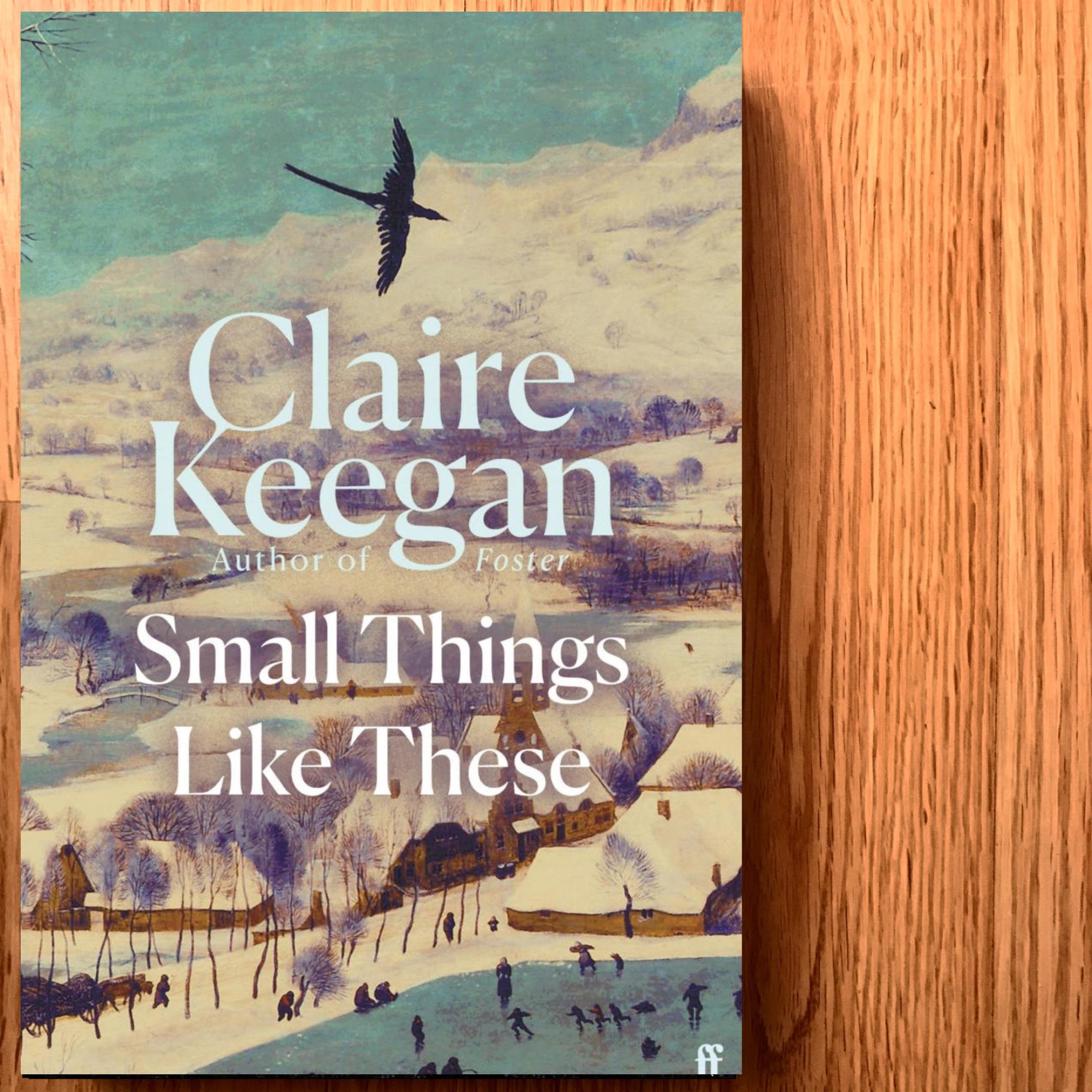By Sara Hailstone
Content warning: abuse, forced adoption
Small Things Like These by Claire Keegan is a story dedicated to the victims of Ireland’s Magdalen laundries. These victims were women and children. The last laundry closed in 1996, and the staggering reality is that nine thousand children died “in just eighteen of the institutions investigated.” No apology had been issued by the Irish government or the Catholic Church, not until Taoiseach Enda Kenny did in 2013. Keegan’s third work offers a concise and humble reckoning of the atrocities committed against these women and children.
Set around the days approaching Christmas, protagonist Bill Furlong, a coal and timber merchant, stumbles into the misery and mistreatment of women in the laundry at his local convent. Furlong is a wholesome family man; he lives with his wife Eileen and their five daughters. He courted Eileen in a ‘high school sweetheart’ way, taking her to “the cinema and for long walks along the town path in the evenings.” Told from his narrative point-of-view, Furlong is quietly facing the edge of midlife and risked mundanity.
Always it was the same, Furlong thought; always they carried on mechanically on, without pause, to the next job at hand. What would life be like he wondered, if they were given time to think and to reflect over things? Might their lives be different or much the same or would they just lose the run of themselves?
His life changes one evening while delivering coal when he finds in a chapel a roomful of young women and girls on their hands and knees polishing the floor. “As soon as they see him, they look like they had been scalded.” These women and girls, roped in rags and black soiled feet, hair shorn and cut with shears, ask Furlong for help. “Mister, won’t you help us?” But, they are locked in by Mother Superior.
In subtle and profound ways, this novel is about women. Women with “their canny intuitions, were so much deeper: they could predict what was to come long before it came, dream it overnight, and read your mind. He’d had moments, in his marriage, when he’d almost feared Eileen and had envied her mettle, her red-hot instincts.” Furlong is surrounded by these women who feel and possess a hinted-at ancient female intuition. Yet, an underlining theme is that amongst the travesties that these women go through, he is unchanged and fears a trivial life. “Might things never change or develop into something else, or new? Lately, he had begun to wonder what mattered, apart from Eileen and the girls. He was touching forty but didn’t feel himself to be getting anywhere or making any kind of progress and could not but sometimes wonder what the days were for.” And when he comes across the young women and girls in poverty and working amongst inhumane conditions at the laundry, Furlong questions, “But what if it was one of ours?”
“Tis not one of ours,” Eileen responds.
And is that the very point?
“When he reached the convent, the reflection of his headlights crossed the windowpanes and it felt as though he was meeting himself there.”
Furlong finds a girl in the coal house, stained in her own excrements with shorn hair. “Tis not one of ours.” And, with a baby that is 14 weeks old, the Mother Superior brings the infant to the imprisoned mother to feed and then they take the child away. “Tis not one of ours.”
“Won’t you ask them about my baby?” the girl implores Furlong, and he is haunted. He waits it out in a quiet confrontation with the Mother Superior in which he knows the religious institution is keeping the treatment and imprisonment of the girls a secret. “Furlong watched the girl being taken away and soon understood that this woman wanted him gone, but the urge to go was being replaced by a type of contrariness to stay on, to hold his ground. Already, it was light outside. Soon, the bells for first Mass would ring. He sat on, encouraged by this queer, new power. He was, after all, a man amongst women here.”
Eye to eye with Mother Superior he does something to shake the privileged security of his world. “Sure haven’t we a house full? What’s one more?” Eileen had said to Furlong about asking a neighbour over for Christmas right before her husband steps out of the door and into a humble village trek to bring the girl with the 14-week-old baby home to him. “Climbing the street towards his own front door with the barefooted girl and the box of shoes, his fear more than outweighed every other feeling but in his foolish heart he not only hoped but legitimately believed that they would manage.”
My only critique amongst this sliver of a hero’s journey: what happens next? The story of the treatment of these women and children by the state and church is unsettling, but Furlong’s experience is necessary to tell. The narrative strives to provide justice for these women and children but could be pulled through in more focus of characterization and the ordering of plot. Furlong faced the critique of an entire village in blacklisting these women and children to moral subordination and inhumane servitude. Keegen succeeds in showing the social normalization of mistreatment within the folds of institutions designed with the assumption to protect others and to be representatives of spirit. Both are neither.
Grove Atlantic published a second collection, Walk the Blue Fields, after acquiring Keegan’s debut story collection, Antarctica, from the young Irish Writer. Now, they have published Small Things Like These.
Thank you, Publishing Group Canada, for the complimentary copy in exchange for an honest review.

